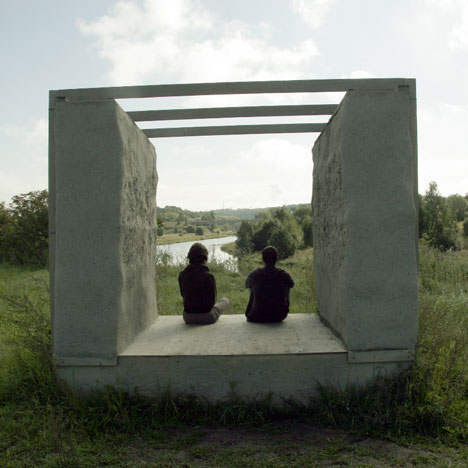When you stand inside one of these riverside pavilions in Turku, Finland, you can hear what’s going on beneath the water’s surface.
Speakers embedded inside the walls of the two structures transmit the real-time recordings of underwater microphones, called hydrophones, positioned in the river.
The grey clay-covered walls of the structures are constructed from bales of lake reed and are perforated by small holes through which the sounds escape.
Media artist Hanna Haaslahti was responsible for the design of the pavilions, while sound artist Marianne Decoster-Taivalkoski designed and realised the sound recording concepts alongside Alejandro Montes de Oca.
Other interesting pavilions featured on Dezeen include a bright green spectator stand and a shelter made from cardboard hoops - see all our stories about pavilions here.
Photography is by Hanna Haaslahti and Thomas Söderström.
Here is a more detailed description from the artists:
Sonic Seascape Terrace by Marianne Decoster-Taivalkoski, Hanna Haaslahti & Alejandro Montes de Oca
Sonic Seascape Terrace is a site-specific project, which explores connections between the seascape and sounds emanating beneath it´s surface. Two terraces, belvederes, constructed on the shorelines of Turku city in Finland are accompanied with a realtime soundscape composition, distributed on the terrace from the hydrophones hidden in the nearby body of water. The speaker system was designed as an integral part of the architecture, making the terrace itself a resonating structure.
Conceptual description
What is the correlation between underwater soundscape and the way the sea looks on the surface? Sound can travel many kilometres under water, so it´s noisy down there, though on a surface the sea appears as a calm and peaceful entity. When we talk about the sea, we tend to refer only to what´s happening on the surface level. But underneath is a secret world, which we know very little of.
The aim of the project is to build view-point terraces, belvederes, in a city with marine shorelines. From each terrace one can hear the real-time underwater soundscape of the seascape visible from that specific view-point. The view over the seascape is framed from the terrace to the place where a number of hydrophones (underwater microphones) are located, so that a viewer/listener standing at the terrace can link the seascape and the soundscape to each other.
The terraces form an exploration into the interaction between the sea and the land, how the sea is reflecting human activities and how city sounds merge into the underwater soundscape. In the same time, it should sharpen our senses to make observations about our surrounding environment not only with our eyes, but also with our ears.
Soundscape studies and acoustic ecology form the scientific background of the project. Acoustic ecology is a rather new field of research dedicated to the study of the sound-based social interactions of living organisms. The composer and researcher R. Murray Schafer created the term soundscape in the 60`s in parallel to the term landscape. Soundscape refers to an acoustic environment in which listeners are immersed, it includes natural acoustic elements as well as those caused by human activities in a specific place of the landscape.
In our project the contradiction between the soundscape and the seascape should raise thoughts about the invisible changes happening under a naturally serene surface. Even if the seascape still looks harmonious and beautiful, its industrial soundscape prefigures something really different.
General description
Lake reed is a traditional building material in Baltic countries. The eutrophication of Baltic Sea has spread it along the coasts of Finland and many are rethinking it´s cabablities as a sustainable building material for contemporary architecture. The LUMO centre (Centre for the natural building materials) of the Turku University of Applied Sciences, involved in the EU project called Promoting Natural Material Know-How assisted in building the terrace from lake reed.
Lake reed has excellent acoustic qualities, thus making it a suitable material for sonic structures. Both walls of the terrace has 20 minispeakers immersed inside the lake reed bales to diffuse the soundscape composition. The walls are plastered over with clay and little holes punctured in the inner walls for sound to reach listeners. All the technology is hidden from the listener. The clay wall is a comfortable surface to lean on and listen to the sounds moving and vibrating inside the terrace.
The terrace is facing towards the origin of the soundscape. The surrounding sounds blend with the realtime composition distributed in the terrace because of it´s open structure.
Technical description
Underwater sounds picked up by submerged hydrophones are digitized and sent with Internet audio streaming to computer running an Max/MSP application which analyzes, processes and organizes the signals into an ambi-sonic four-channel soundscape composition. Speaker systems built inside the walls of the terrace located on the shoreline, diffuse the real-time soundscape around the listeners.
Project Team
Sound concept: Marianne Decoster-Taivalkoski
Visual concept: Hanna Haaslahti
Realtime composition and application design: Alejandro Montes de Oca
Location: Turku, Finland
Duration: 31.05.-1.9.2011
Produced by: Capsula (Curated Expeditions on the Baltic Sea) for the Turku European cultural capital 2011
In collaboration with:
The Centre for music & technology at Sibelius Academy
Turku University of Applied Sciences, Lumo center
BalticSeaNow.info
AVEK Audiovisual promotion Center of Finland
Arts Council of Finland

